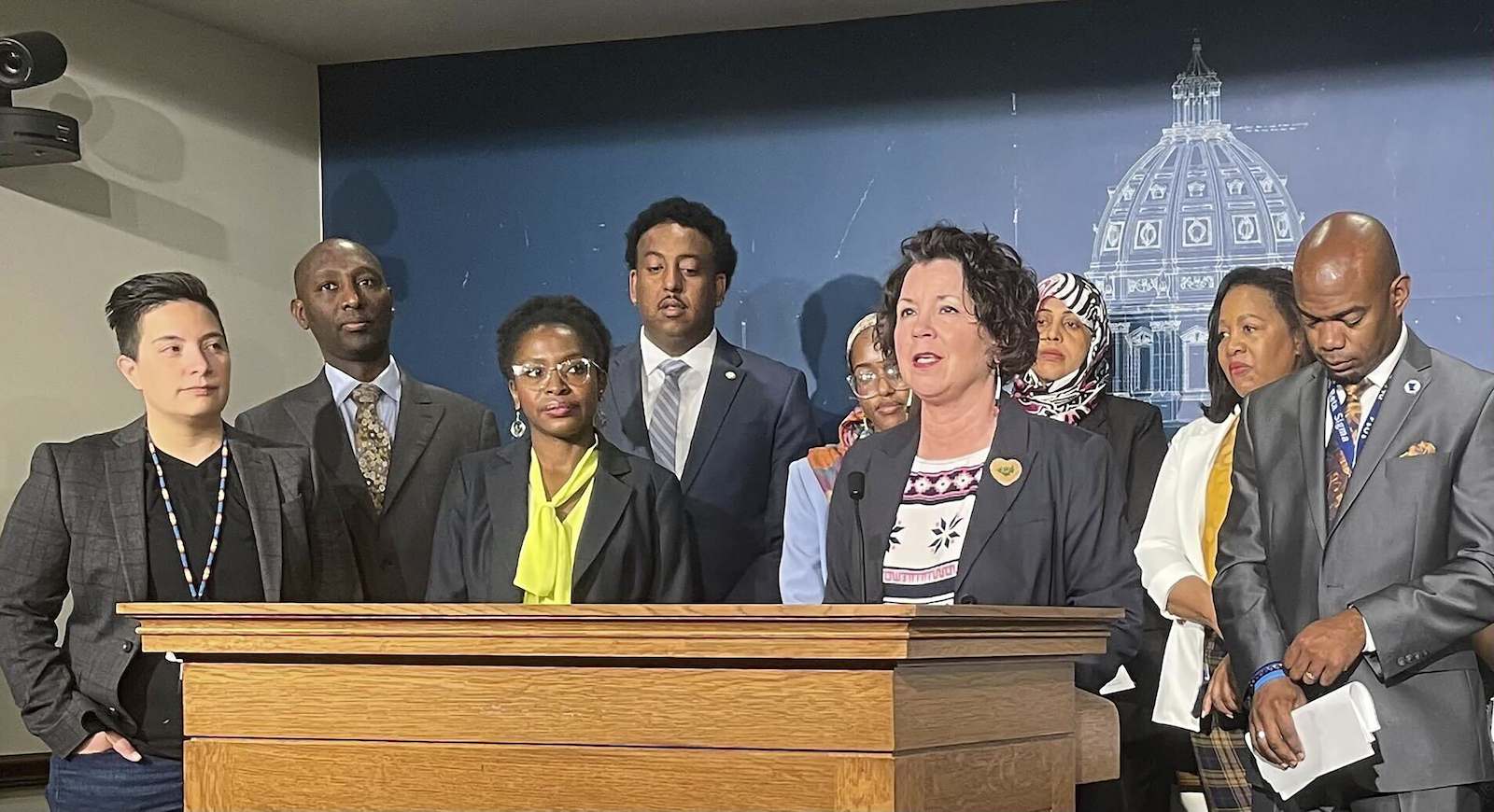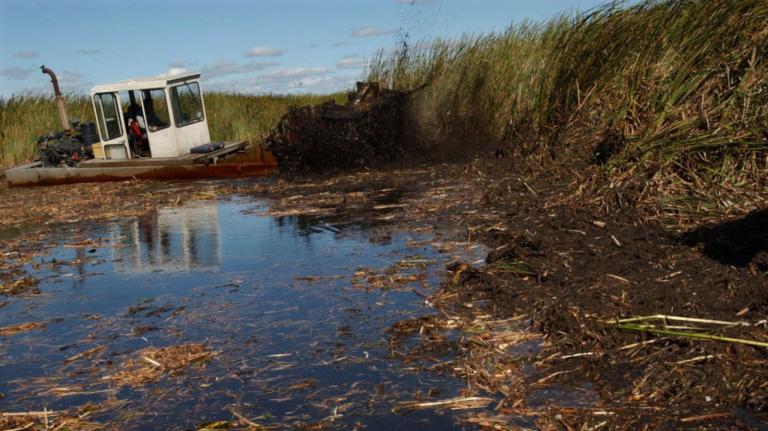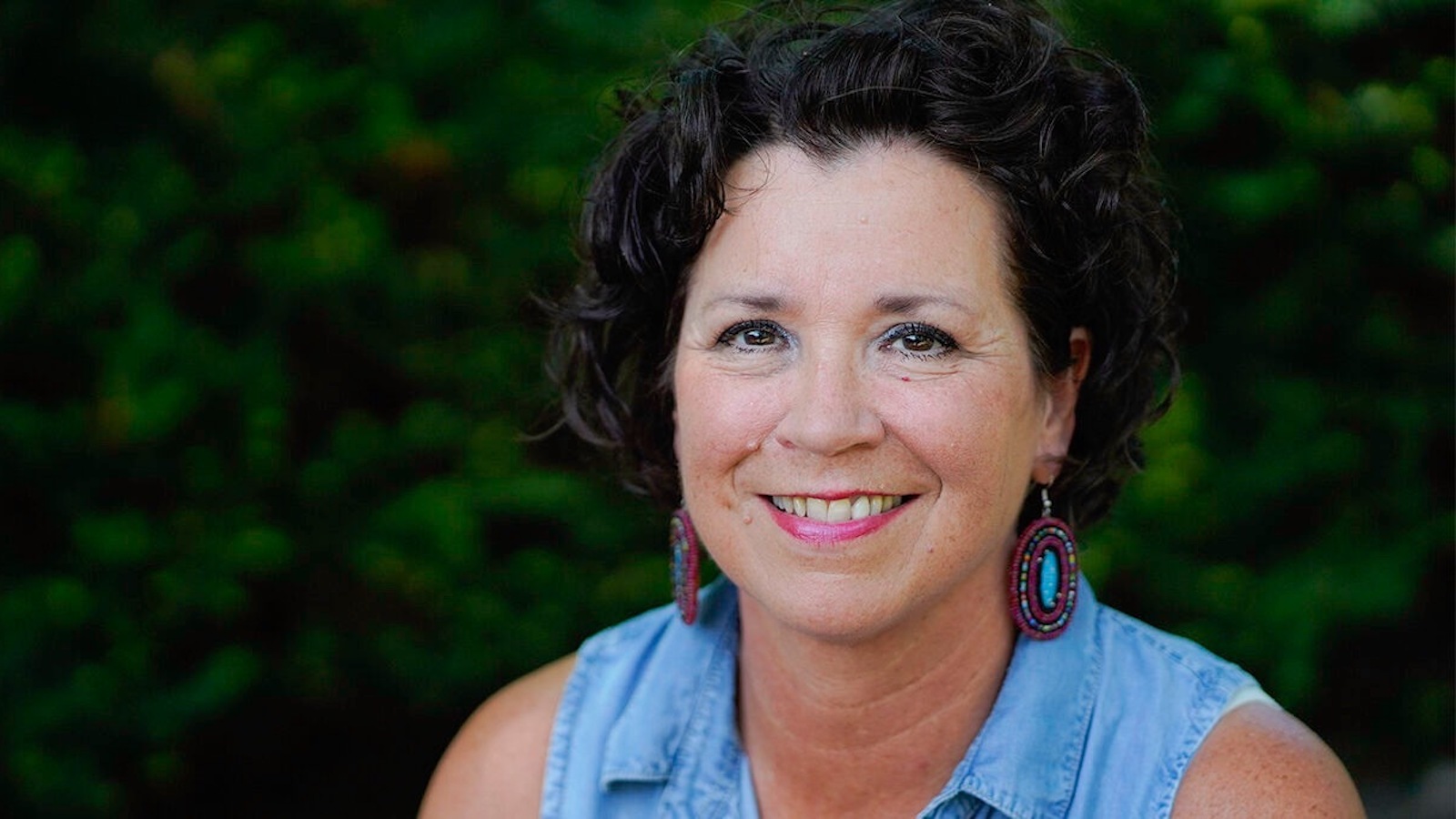As a kid, Mary Kunesh watched her dad travel to reservations in northern Minnesota, working as a pro bono attorney for tribal nations who needed legal assistance. She heard stories from her grandfather about her family’s history, filled with brave Lakota women like her aunt Josephine Gates Kelly, the first tribal chair of the Standing Rock Sioux Tribe.
As a child, Kunesh learned how the U.S. forced Native people from their homelands, agreed to provide housing, education, and economic opportunities in exchange, then reneged on those agreements. She learned how settlers changed the landscape by erasing forests and eliminating buffalo, and how dam construction displaced Indigenous peoples, again, making it possible for mills and factories to pollute the water and air.
But as Kunesh got older, she realized that history wasn’t widely known: Non-native people around her often accepted reservations as normal and didn’t realize just how tribal nations arrived there.
Now, Kunesh is the first Native woman to serve in the Minnesota state Senate.
Last year, she authored legislation that returned sacred land to the Upper Sioux community, and this year she successfully pushed through a bill to give land back to the Mille Lacs Band of the Ojibwe. She is also working on two bills to return state land in White Earth State Forest back to the White Earth Nation and land in Upper Red Lake back to the Red Lake Nation. The latter two bills died this year after generating lots of pushback locally, but Kunesh said she doesn’t plan to give up.
“There are a lot of people who say, ‘Well. that was then, we should just forget about the past and move on.’ But no, legally, those lands belong to the tribe, and they should be returned to the tribe to be the steward of the land,” she said.
Grist spoke with Kunesh about what motivates her, and what she sees as the future of the landback movement.
This interview has been edited for length and clarity.

Q. How would you describe the connection between the landback movement and climate change?
A. A lot of the lands here in Minnesota that we’re asking to be returned have been stripped of all of their timber. They’re commercialized — the lake and the shorelines are commercialized, and have a lot of people coming and going and bringing in invasive species, not treating the environment the way that they should. When it was just the Indigenous people on the lands, the lands were healthy, the four-legged animals were in sync with the seasons and it was a symbiotic relationship with the human beings. It’s important that we allow the tribes to go back to their Indigenous roots of caring for the lands, and I think we’ll see a really positive outcome from doing just that.
I was in Washington, D.C., last week and ended up sitting next to an Anishinaabe woman from Red Lake that I had been corresponding with, and we had a really good discussion about how important it is to retain the stewardship of the lands to the Indigenous people. I didn’t know this, but northern Minnesota used to have a very strong and robust caribou population. And now they are all gone. The whitetail deer have replaced them, but it’s because all of the white oak forests have been cut down. And those white oak trees, the lichen likes to grow on it and that’s what the caribou ate. So once those forests were gone, the caribou were gone. That’s another example of how, through colonization and timber destruction, we pushed away a whole part of the environmental cycle in northern Minnesota. So it’s vitally important that the Indigenous people are able to recover their lands and manage and care for the lands the way that the ancestors have done for hundreds of years.
Q. One of the bills you succeeded in passing this year requires Minnesota to offer to sell state lands within a reservation’s borders, or just outside, to that tribe first, at its appraised value. Why did you push for that measure?
A. I think it is really important because, number one, it allows the tribe to expand tribal lands that are connected to them, but it also helps to provide a buffer around those tribal lands. Often these are lands that might be wooded land, these might be natural bogs, they might be wild rice lakes. They might be the site of medicinal and sacred plants that have been here forever. I think it honors the sovereign rights of the nations, that they too have the right to to purchase lands just like anybody else. And why would we not at least provide that? Sometimes those lands sit there for decades as tax forfeited land and it’s not generating any taxes at all. And this is certainly a way to help some of those counties that tell us time and time again, “We’re the poorest county in Minnesota, and don’t take our lands.” This is a way to work with those counties to generate the income that they need.
Q. What would you say to critics who say that Indigenous people shouldn’t have to buy back their lands?
A. I would agree with them. In general I don’t believe that the tribes should have to pay for those lands at all. But if that’s part of the deal and the tribe agrees to it, then they should be able to express and use their sovereignty to make their own individual agreements.
Q. What has been surprising to you about this work?
A. We have a really strong base of support by non-Indigenous people here in Minnesota. Many of the faith-based organizations, environmental organizations, those that are sensitive to the inequities and the racism in Minnesota toward our Indigenous people, are very much in support of these landback bills and very happy to come in and write letters to the newspaper, and come and testify when we have hearings at the Capitol. So this isn’t just an Indigenous-only movement. There are many, many organizations and individuals who do not identify as Native who who support the work that we do.
These [faith-based] organizations look to the doctrine of discovery, the papal decree that says to send all these explorers out and any land that they touch can be claimed for whatever country they represent — that you can take all the riches, that everything you find you can claim for country.
They recognize the injustice of this and the destruction to the Indigenous people that lived on the lands before Europeans came to it. It’s an opportunity to not undo but pay the piper for what happened to the Indigenous people, recognizing the fact that they never got their due for all these hundreds of years. And so for them, I think they feel it really is a moral issue and are willing to stick their necks and, oftentimes, their money and their time out for this.
Q. What advice do you have for other Indigenous advocates who are hoping to make landback and similar goals happen in their own communities?
A. I think the first thing that I would counsel our people in — and this is a really hard thing for most of them — is to become involved in the community. For so long, Native people were not encouraged or welcomed into city council or school boards or those positions of decision-making for the community. They felt unwelcome. They felt racially separated. They felt threatened, and they didn’t feel heard or recognized. And with the rise in Native folks starting to run for these positions, I think has made a really big difference.
I’m the first Native woman to serve in the Minnesota Senate in history. And that’s a sad thing. You know, people say, “Oh, hooray, the first, the first!” But we have to stop being the first. We have to be the second, fourth, eighth, 50th. When I was elected to the Minnesota House, there were only two Native women before me that served in the House. And so my suggestion would be, please, start stepping up and serving in ways in your community, not only to show that tribal people are involved in their community, but they also bring such a unique voice to the issues at hand. And it might be hard to speak about those issues, especially when they’re really personal, it might be hard to advocate for your people when you’re outnumbered and historically have been treated so poorly. But the more of us that get into positions where we can talk about the hardships and the historic trauma that our people have had and work for positive change, I think it will serve all of our communities, Indigenous anywhere, whether it’s South America, Australia, New Zealand, North America, wherever — even the Sámi people over in Finland. But we do have to start showing up, and we do have to start putting ourselves in positions where we can make decisions that are going to be good not just for our own folks, but for all of the communities that we represent or the states that we represent.
Be present. Be vocal. Write letters to the editor about important issues and work with your community in ways that are going to build trust and collaboration so when an opportunity to do things like returning land, when there’s a huge opposition, maybe you’re in a position to speak to it or advocate for it or educate people around the issues. But we can’t sit back anymore and not participate. And the other thing is please participate in elections and know who represents you and are they representing you and your community in the best way? And if not, either become that candidate or support candidates that represent your values and your goals in life, not just for today or tomorrow or the next 10 years, but like we say, for the next seven generations.
Q. If all goes well with landback efforts, what could happen next?
A. What I would really like to see is the ability for the tribes to manage the lands that they were promised, and that the United States and Minnesota validate and honor the treaties as they were written and then not get in the way or not try to micromanage the tribes when those lands are returned. Let them do it through their own, sovereign governments. I think we will be a better state for that. I think environmentally, we certainly will. Especially when we are concerned about mining in Minnesota and the waterways of Minnesota. The last thing we want to see is any of those things polluted or destroyed, but also we could see the return to some of the Indigenous lands, the bog lands, the prairie lands, the woodlands, that support the environment in a really good, healthy way. Through co-managing or co-stewarding Minnesota will become a healthier place, a happier place, and a place where the racial tensions that have existed — that most people won’t acknowledge — become almost nonexistent.
This story has been updated to clarify that Kunesh is the first Native woman to serve in the Minnesota state Senate and her aunt is Josephine Gates Kelly.




